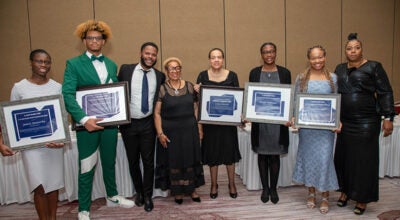Judge: School Board violated FOIA
Published 12:37 am Friday, July 17, 2020
|
Getting your Trinity Audio player ready...
|
Following a four-day trial, a Suffolk Circuit Court judge found that the Suffolk School Board and the majority of its members violated the Freedom of Information Act with regard to meeting notices, vague closed-meeting motions and certifications of closed meetings.
Judge Carl Eason Jr. ruled July 16 that the board — including Chairwoman Phyllis Byrum, Vice Chairwoman Dr. Judith Brooks-Buck, Lorita Mayo, Tyron Riddick and Karen Jenkins, who were all named as defendants in the lawsuit — did not provide proper notice of public meetings and ruled that the motions to go into closed meetings were too vague and that the certifications of closed meetings were “not sufficient.”
Board member Sherri Story, who last month had been publicly censured by the board for violations of its norms and protocols, brought the lawsuit against the rest of the board after having alleged numerous violations of the act during her tenure on the board, which began in January 2019. Another member, David Mitnick, was also named in Story’s suit, but only as a nominal defendant entitled to notice.
Eason ruled that the board did not violate FOIA as it relates to its discussions during closed meetings, nor was it in violation of the act as it related to polling.
The judge ordered that board members read the Freedom of Information Act within 14 days of his ruling, and that all receive training on it within 60 days. He also ordered the board to comply with open and closed meeting requirements regarding motions, notices and certifications, and ordered that all public vote requirements be followed. He also told the board that if members receive legal advice on FOIA from their attorney, Wendell Waller, and they are not satisfied with his advice, they are required to consult the FOIA Advisory Council.
The judge had previously ruled on the third day of the trial that the board did not violate FOIA on the issue of Story not being allowed to attend a closed meeting remotely, and said the board did not violate the act with regard to polling its members as a substitute for voting.
No punitive damages were awarded, as Eason said the board and its members did not willfully or knowingly violate the act.
Eason, in delivering his ruling, said he hoped the board would re-evaluate its conduct and hoped that it could go forward in a “congenial and professional manner.”
“Clearly, there’s a fracture of this board at the moment,” Eason said.
Ann Sullivan, the lead attorney representing the board, declined comment following the ruling.
Attorney Kevin Martingayle, representing Story, said the ruling was vindication for her efforts to fight for transparency in board operations and said the goal is getting compliance with FOIA going forward.
“It has been an incredibly frustrating process that we believe took far too long,” Martingayle said. “The defense fought us at every turn. There was really no need for all of that. We are very gratified with the outcome. We think that the judge did a great job controlling the process and we believe that he is fully justified in granting the relief that we requested.”
Every board member testified
Over the course of the trial, every board member, including Story, testified, as did Superintendent Dr. John B. Gordon III, Mayor Linda T. Johnson and three Suffolk Public Schools administrators.
Martingayle, while noting what he said were numerous board violations about providing public notices and minutes of committee meetings, focused heavily on a Feb. 13, 2019, City Liaison Committee meeting held the day before a School Board meeting.
Two others testifying on Story’s behalf — Meg Diggs and Patricia Holloman — said on the opening day of the trial that they were concerned that there was a City Liaison Committee meeting, and Holloman raised an issue with it at the board’s meeting the following day. Both were advocates of an inclusive play project at Northern Shores Elementary School and had gotten board approval for it, but that was contingent upon expansion of the school through the Capital Improvements Projects and Plan.
Diggs, who watched the board’s Feb. 14, 2019, meeting from home, said Mitnick asked about the City Liaison Committee and got a brief report about it from Byrum, who along with Brooks-Buck, serves on the committee.
Mitnick later testified via video that Byrum gave a brief report about it during the board’s meeting, noting briefly who was there and what they discussed.
Brooks-Buck, in her testimony, said the meeting with the City Liaison Committee lasted about 30 minutes and was just with the leaders of both the board, City Council, city staff and then-Superintendent Dr. Deran Whitney. Byrum said the liaison committee meetings have been called by the city, but they were not advertised and were not committee meetings — “they were a liaison, not a committee,” she said.
In the minutes to the Feb. 14, 2019, board meeting, Byrum noted that Whitney and the City Liaison Committee “met with the City Manager, Mayor and Vice Mayor and discussed budget, future of the school division and focused on capital improvement needs.”
“Amazingly, they’re trying to deny the truth of their own Feb. 14 minutes,” Martingayle said in responding to Sullivan’s July 16 motion to strike.
Johnson testified that there is no agenda prepared for what she termed informal meetings and that they are not advertised. She said none of the previous meetings had been public, and said besides setting the agenda and order of speakers, there was nothing else discussed except to congratulate the school division on having all of its schools accredited.
The mayor said there was no budget discussion, but under cross-examination from Martingayle, she said they did bring up appropriations and capital needs as topics to be discussed at the joint meeting. She also said that’s how the two bodies have been coordinating joint meetings for more than 20 years.
He said because there were neither minutes nor a public notice of a meeting, it “is a flagrant violation of what is required.”
Sullivan argued in that motion to strike that no secret meetings took place, but focused on Finance Committee meetings, two of which, she noted, took place this year with public notice provided and minutes taken.
Story spent more than six hours giving testimony over three of the four days of the trial, outlining her FOIA concerns dating from the time she was sworn in as a board member in January 2019.
Sullivan, in her opening argument, said Story came to the court with “unclean hands” because she had voted to go into closed sessions, and had voted to certify closed meetings in the past.
Story said in her testimony that she could not recall ever voting no to go into closed session, and acknowledged voting to certify closed meetings in the past, though she said she had regrets about not voting no on certifying other closed meetings.
She acknowledged voting against allowing Riddick to participate remotely in a closed meeting, but testified that she could not remember why. When asked about saying that it was illegal to keep her from participating in a closed meeting electronically, but not agreeing to Riddick’s virtual participation in a closed meeting, she said she learned and grew from that.
“I never said I was perfect with the law,” Story said.
Two days later, as Collins was cross-examining Story and asking whether she had ever recorded audio or video in closed session, Martingayle objected, saying that Story’s conduct was not on trial.
“What does her conduct have to do with whether or not the defendant violated the issues of FOIA?” Eason asked in sustaining Martingayle’s objection.
Story stated she had also been concerned about closed-meeting motions not being specific enough, and had shared with the board a FOIA Advisory Council opinion about it.
She also said she was concerned about the vagueness of a closed motion from June 11 that called for discussion of a specific public officer, without naming that person. In the closed meeting, she said she learned that she was the public officer to be discussed.
Story also had concerns about the discussion of transgender guidelines in closed meetings. The only public knowledge of anything to do with a transgender issue, she said, came through motions for closed meetings for five board meetings over a five-month period from October 2019 to February.
Story said there was never a vote on the guidelines, but “there was a nodding around the room.” After that, Gordon provided them to building administrators.
Gordon testified that he had learned about issues related to a pair of transgender students that caused him to want to develop the guidelines, also acknowledging that the General Assembly had already asked local school divisions to have them in place by the start of the 2021 school year.
He said the guidelines did not need to be voted on or discussed in public because they were not policy that the board was to be voting on, and that the board had limited input in creating or amending them. Gordon said Waller was present at all the closed sessions in which transgender issues were discussed and offered legal counsel on the issue.
And though the court did not rule in Story’s favor on the discussion of transgender guidelines in closed session, it ruled favorably to her on other transparency issues.
“We only had to prove one violation,” Martingayle said. “We proved a lot of violations.”






